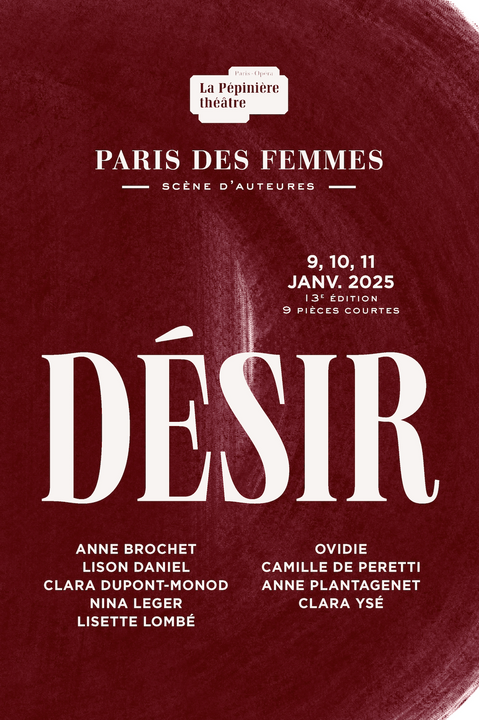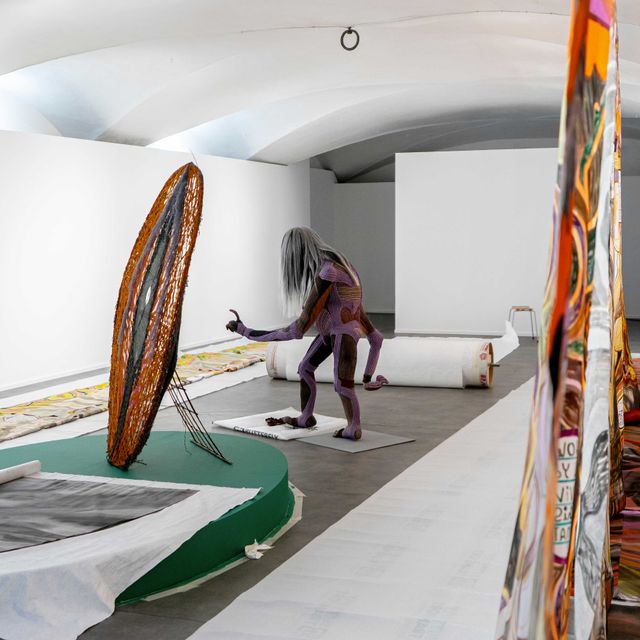Culture - 11/26/24
A marvelous odyssey in the name of female creation and a formidable laboratory for research and sharing, the Paris des femmes festival – founded in 2012 and directed by Anne Rotenberg, accompanied by Sylvia Minne and Caroline Verdu – shines light upon on the vision, audacity and inventiveness of contemporary women authors.
A commitment dear to Maria Grazia Chiuri who, since 2016, has nurtured prodigious artistic dialogues with fascinating multi-disciplinary personalities during her Dior shows.
For the third year running, the House of Dior is delighted to support these exceptional encounters dedicated to writing, the theme of which this time is “Desire”. A spellbinding topic, bringing together Anne Brochet, Lison Daniel, Clara Dupont-Monod, Nina Leger, Lisette Lombé, Ovidie, Camille De Peretti, Anne Plantagenet and Clara Ysé. Their nine texts will be performed – on January 9, 10 and 11, 2025 – at the Théâtre de la Pépinière in Paris, and published by L’Avant-scène Théâtre.
Over the past twelve years, Paris des femmes has gathered and encouraged the (re)discovery of more than 100 of the most talented women in literature*, film, music and theater, including Jeanne Benameur, Anne Berest, Claire Berest, Jane Birkin, Geneviève Brisac, Barbara Carlotti, Isabelle Carré, Claire Chazal, Catherine Cusset, Marie Darrieussecq, Agnès Desarthe, Valérie Donzelli, Claudie Gallay, Brigitte Giraud, Nancy Huston, Irène Jacob, Camille Laurens, Noémie Lvovsky, Tania de Montaigne, Anna Mouglalis, Marie Nimier, Amélie Nothomb, Véronique Olmi, Véronique Ovaldé, Tatiana de Rosnay, Olivia Ruiz, Lydie Salvayre, Leïla Slimani, Joy Sorman, Amanda Sthers, Karine Tuil, Maud Ventura, Delphine de Vigan, Alice Zeniter and Rebecca Zlotowski, to name but a few.
Over the years, many of the performances dreamed up for this inspiring happening have metamorphosed into long-term projects, forming virtuoso bridges from one realm to another. Helena Noguerra’s Un dernier rêve pour la route, for example, became a play to be presented at the Théâtre du Rond-Point in Paris in 2023, while Delphine de Vigan’s Merci turned into a captivating book – Les Gratitudes – now adapted for the stage – notably at the Théâtre de la Porte-Saint-Martin, from March 2025.
These events, without exception, echo the values and heritage of the House of Dior, which since its very beginnings in 1946 has never ceased to forge ties with the arts in all their forms. Such alliances were initiated by the founding-couturier, who started out as a gallery owner and went on to become a collector, aesthete and friend of the greatest artists of the 20th century.
Today more than ever, Maria Grazia Chiuri perpetuates this fabulous story by fostering collaborations with female artists from all cultures – writers, illustrators, choreographers, filmmakers... An ode to passion, sisterhood and self-assertion that resonates perfectly with the creative essence, pluralistic and unique, of the Paris des Femmes festival.
A tremendous collective energy
The Paris des Femmes festival came into being in 2012 on the initiative of Anne Rotenberg (artistic director, adaptor, stage director), Michèle Fitoussi (journalist, novelist and screenwriter) and Véronique Olmi (novelist, playwright and actress). Together, they had the ambition and drive to give greater visibility to women, particularly in the worlds of theater and literature.
Since 2017, a new team has formed around Anne Rotenberg with Sylvia Minne (journalist, producer and founder of Reading Wild), Caroline Verdu (director of Théâtre de la Pépinière Théâtre) and Patrick Séguillon (administrator, trainer, actor).
Desire – theme of the 13th Paris des Femmes festival
An infinite source of inspiration, at the heart of the House of Dior since its beginnings in 1946
From the moment he stumbled across his lucky star on one street of Paris, Christian Dior was driven by a strong determination and unquenchable desire: to found his own fashion house.
“At night, I would wake up and doodle some more, go back to sleep and pursue my dream, a dream obsessed with dresses,“ he confided, in Je suis couturier. In just ten years – from 1947 to 1957 – Monsieur Dior revolutionized the codes of elegance and built an empire of extraordinary influence, where desire was at the very heart, inextricably linked to the identity, history and raison d’être of his House.
“What I want more than anything is to make women utterly desirable“, he wrote. In the aftermath of the war, he knew it was urgent to restore the imperious desire for beauty, seduction, audacity and dreams: a vital impulse. As early as 1947, desire was already unfolding in the eyes of women contemplating and discovering the emblematic New Look, which emphasized and sublimated the curves of the female body as never before. With it, Christian Dior defined the manifesto of a timeless allure, ever more desirable in the image of a suit he entitled “Désir”.
A vision fervently pursued by his successors: Yves Saint Laurent’s “Tramway nommé désir”, another called “Ardent désir” conceived by Gianfranco Ferré, and the latter’s autumn-winter 1990 Dior ready-to-wear line with its sub-theme “Où le désir encore va chanter” are all revealed.
Today, this subject carries on through Maria Grazia Chiuri’s collections. Each season, it continues infusing the magic of Dior pieces, from couture to fragrances, from Miss Dior, an iconic perfume created the same year as the New Look, which dressed women in a wake of desire, to J’adore, an irresistible symbol fully reflecting feminine power.
From past to present, the muses of the House embody a magnetic force, between refinement, grace and modernity, a rare and subtle alchemy: that of desire in all its forms.
SHARE





